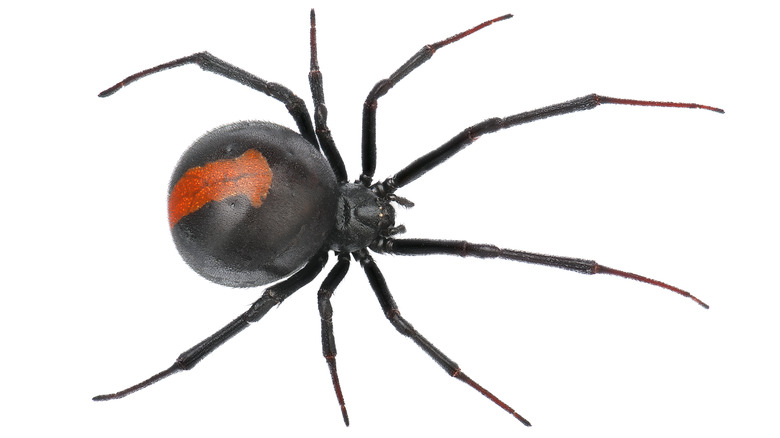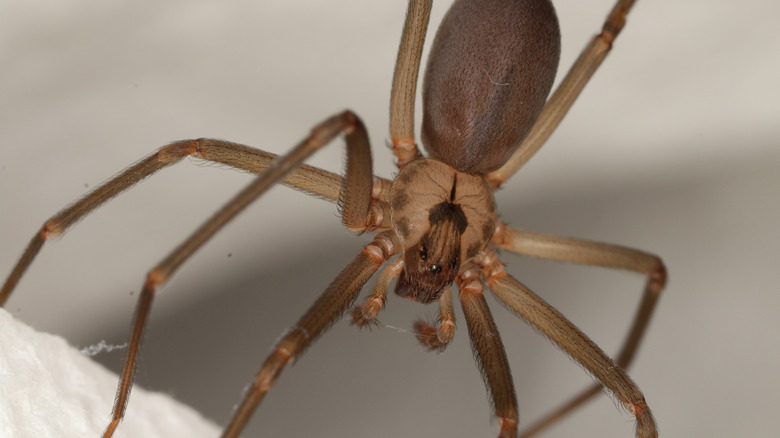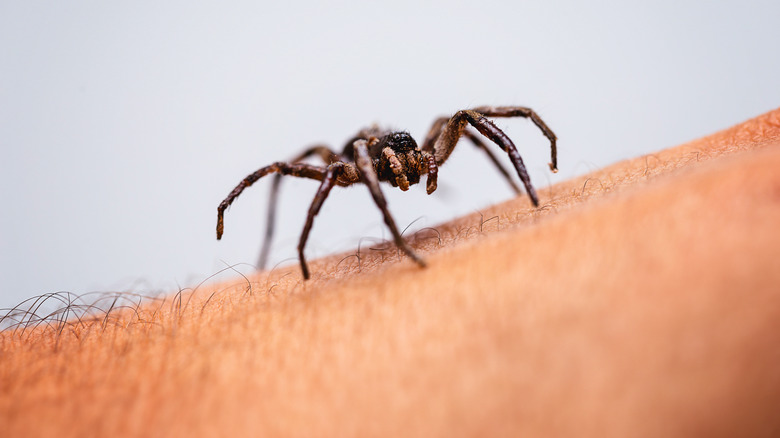The First Thing You Should Do After Getting A Spider Bite
If you have a fear of spiders, there's some good news that should calm you down. Most spiders in the United States are not dangerous and rarely bite (via Healthline). Even if they do, their fangs are usually too small to break through human skin. Sometimes, spider bites result in itchy, red wounds similar to other insect bites. Only very rarely do spider bites cause serious problems in people.
If you do get a spider bite, stay calm. The first thing to do is to try to identify the spider if you can. In the US, only a few species of spiders out of more than 60 pose any danger to humans. One of these is the black widow spider. Black widows, which are mostly found in Western and Southern states, can be identified by the red hourglass shape on their abdomen (via Cleveland Clinic). Another dangerous spider is the brown recluse, which lives in Midwestern and Southern states. These brown spiders are also called violin spiders, after the dark, violin-shaped mark on their heads. Finally, hobo spiders, which are mostly found in the Pacific Northwest, have a grey, V-shaped pattern on their abdomens.
Symptoms of a dangerous spider bite
Symptoms of a black widow spider bite can come on quickly and cause sharp, pinprick-like pain. Other symptoms include trouble breathing, painful muscle cramps, profuse sweating, droopy or swollen eyes, nausea, vomiting, and an itchy rash. Bites from a brown recluse typically do not cause pain right away. Rather, you may experience pain, itchiness, and redness within 8 hours. The bite can also blister and may progress to a skin ulcer if not treated. Hobo spider bites do not usually cause pain, but may lead to severe headache, red and swollen skin, hardened skin at the site of the bite, blisters, fatigue, nausea, and problems with memory.
Very rarely, spider bites cause severe complications like coma, seizures, kidney failure, and even death. Bites from black widow spiders are the most serious. Spider bites are most dangerous in children under 16 and older adults over 60. However, in the United States, fewer than three people die every year from a spider bite, according to the Cleveland Clinic.
Treating a spider bite
If you know you have been bitten by a black widow, brown recluse, or hobo spider, seek medical care immediately (via Mayo Clinic). If you or someone you know is having trouble breathing or showing signs of full body shock, call 911. See your doctor if you think you're experiencing symptoms of a spider bite or if symptoms aren't going away with time. If you've been bitten by a dangerous spider, your doctor will administer the appropriate treatment.
However, most spider bites can be treated at home. Do not attempt to remove or suck out any venom from a spider bite. Rather, the most important thing to do is make sure the bite is cleaned with warm water and soap. If possible, elevate the area that has been bitten and apply an ice pack or a cold, damp cloth. You can take an over-the-counter antihistamine for itching and swelling and an over-the-counter pain reliever for pain and swelling.



